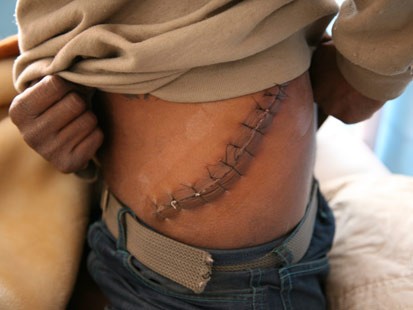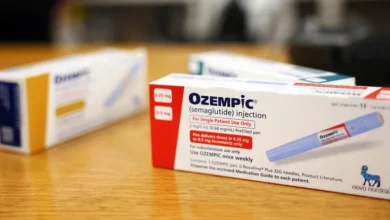
Many accounts of Egypt’s black market organ trade have surfaced over the years when youths with shoddy scars would describe tales of amateur-performed organ transplants, executed for various tragic reasons, though usually revolving around money. Less documented, however, are the sociocultural characteristics surrounding issues of organ transplantation in Egypt that by extension allow for this phenomena to exist.
In her forthcoming book, titled “Our Bodies Belong to God: Organ Transplants, Islam, and the Struggle for Human Dignity in Egypt,” scholar Sherine Hamdy, assistant professor of anthropology at Brown University, has, using over ten years of research, attempted to look at the deeper sociocultural issues surrounding organ transplantation in Egypt and why it remains such a controversial issue.
Before the book’s release next month, Hamdy met with Egypt Independent to discuss some of the key issues raised in her work.
Egypt Independent: What is new about your book?
Sherine Hamdy: Rather than focus on sensational topics about organ transplantation, I used major debates surrounding the ethics of organ transplantation in Egypt as a lens to understand larger social processes, such as how we can trust moral authorities, why people become so agitated around issues concerning treatment of the dead, cases of people’s vulnerability to ill-health, as well as whose responsibility it is to provide health treatment to Egypt’s citizens.
Egypt Independent: With regards to organ transplantation, your book often refers to “Egypt’s crises of authority;” could you elaborate?
Hamdy: One of the reasons why organ transplantation has remained unresolved as a bioethical “dilemma” in Egypt for over thirty years is the fact that the mechanisms that are supposed to resolve the questions are in crises of authority. You have physicians on both sides of the debate arguing about whether patients who are brain-dead can be sources of organs, and these medical debates influence the opinions of the religious scholars. Religious scholars using the same language and the same sources might come to different interpretations on whether one can donate, receive, buy or sell an organ. People expect that doctors or religious authorities will advise them on what to do, but at the same time there is a sense that these authorities can abuse their moral positions for their own gain.
Egypt Independent: How does Islam — with regard to your book’s title — tie into this?
Hamdy: Well, the title of the book, “Our Bodies Belong to God,”comes from a statement uttered by the famous Egyptian television sheikh Mohamed Mutwalli al-Sharawi who declared it as a position against organ donation. But throughout the book I demonstrate that this statement is not so straightforward — a mother who donates her kidney to her son might exclaim in gratitude that God gave us the chance to use our bodies in this life-saving way; or someone might utter that the body belongs to God as a statement against the ways people are being made vulnerable to disease via political corruption and the irresponsible dumping of toxins in their communities. There is no lived religion outside of society; people come to understand what is beneficial or harmful — in both medical and religious terms — based on their experiences.
Egypt Independent: How do these crises of authority then manifest within the community, and who gets affected the most?
Hamdy: A big part of my story is the withdrawal of state services in the past three decades, and the increasing gap between the rich and the poor.In a context in which the gap between rich and poor is only increasing, organ transplantation made these inequalities all the more visceral when those with means could benefit off the very flesh of the poor. What is interesting is that when you have a big public debate as this one, you start to see underlying social issues — like about the increasing socio-economic inequality, or the lack of regulation of medical institutions, or the increasing use of religious discourse in public space — come to the surface.
Egypt Independent: So, essentially, without proper authority with regards to organ transplants and a lack state services, the poor naturally become victimized?
Hamdy: The poor face multiple burdens: they are more likely to fall ill, more vulnerable to medical mismanagement, and they are also more likely to be the source of organs. Families might liquidate all of their assets to give one of their sons a kidney transplant, after which he may die on the operating table; however, then the brother who provided the kidney might fall ill and also die a few years later. Some say the “solution” is to avoid living donors, and to rely on the dead, but this too is difficult. When people have had to struggle so hard just to get by day by day, it’s not easyfor family members to turn over their dead to be cut up and have their insides extracted; the least that they expect is what they perceive as dignity toward their dead bodies. In Egypt, there are elaborate social and religious meanings attached to death that answer the question of why a person has to die; such that meaning is not thought to have to be “remade” through the miracle of organ transplantation, as is often the case in the US.
Egypt Independent: What role does the media play in all of this?
Hamdy: The media plays a huge role. In the US, the media portrays organ transfer as a “medical miracle” or “gift of life” with little attention to social inequalities that are also present. In Egypt, particularly since the 1980s, there has been a lot of media exposure on the poor’s vulnerability to exploitation, which in fact occurs everywhere that organ transplantation is practiced, to varying degrees. These portrayals affect how people perceive the issue.
Egypt Independent: When you started your research in 2002, there was no national organ transplant law, but in 2010 a law was passed. What is your view on this?
Hamdy: Well, a law has been put in place criminalizing the trade in organ transplants but I can’t say whether it’s properly enforced. In any case, given Egypt’s situation, criminalizing the black market trade abruptly is not necessarily a positive move because it can drive the practice further underground where it becomes even more dangerously unregulated. It would be preferable to make sure that all transplants occur in a more transparent way where medical standards are ensured and follow-up treatments are required for donors, rather than singularly focusing on whether or not money is being exchanged for an organ.
Egypt Independent: To resolve some of the issues of organ transplantation in Egypt, you emphasize that society must not only focus on the actual procedure, but also scrutinize what is causing people to suffer from organ failure in the first place. Could you elaborate?
Hamdy: Yes, in the book I am arguing for a more political and economic orientation of bioethics. I want academics to recognize that bioethical dilemmas originate outside of the medical clinic. Many poor people suffering from kidney and liver failure in Egypt are keenly aware that their lack of access to safe and clean environments has predisposed them to organ failure. We must look at the deregulation and privatization of major industries that has led to increased community exposure to dangerous toxins like pesticides, chemical fertilizers or industrial waste. So far, widespread understandings of the cause of organ failure, as the result of the general weakening of the body in a contaminated environment, have already played a major role in determining patients’ decisions to refuse organ offers from relatives. I often heard them argue that they were loath to leave their loved ones “incomplete” — without an organ — in the same environment that made their own “complete” bodies ill.
Egypt Independent: Any final words on how to resolve these issues, also with regard to reconceptualizing bioethics?
Hamdy: Bioethics — whether secular or religious — doesn’t need to be about abstract principles or rigid rules. We have tended to ask for a single moral answer, about whether it is “halal” or “haram,” when talking about organ transplantation, which is actually a big umbrella term that includes a large array of issues that are continually changing with advances in medical practice and changes in treatment access. We need a more practice-oriented approach that allows for assessing the best possible medical and social outcome in each specific intervention. For example, we could work toward composing review committees that look at different cases that receive input from family members who have experienced organ transplantation, social scientists and medical experts. With a more practice-orientated approach, we will have to recognize that there will always be multiple perspectives on right and wrong and not one-size-fits-all solutions to these delicate cases.



